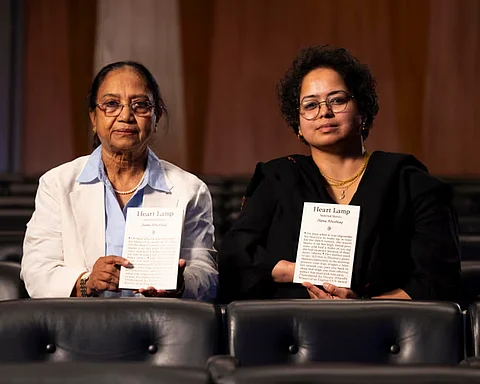

Heart Lamp, a short story collection by Banu Mushtaq and translated by Deepa Bhasthi, has won this year’s International Booker Prize for translated fiction—marking the first time a short story collection has received the prestigious award. Originally written in Kannada, the book was praised by judges for its originality and depth.
Max Porter, author and chair of judges, described the collection as “something genuinely new for English readers: a radical translation” of “beautiful, busy, life-affirming stories.” The twelve stories, selected and translated by Bhasthi, highlight the lives of women navigating patriarchal structures in southern India. Bhasthi chose the pieces from around 50 stories across six collections written by Mushtaq over three decades, becoming the first Indian translator to win the prize.
The £50,000 (Rs 53 lakh) award, shared equally between writer and translator, was presented on Tuesday evening at Tate Modern in London. Actor Ambika Mod read from the winning work in a video shown at the ceremony.
Writing about the shortlisted titles in The Guardian, critic John Self called Heart Lamp a “worthy winner”, noting the book’s tonal range from “quiet to comic” and its consistent vision.
Porter said the judging panel—which included poet Caleb Femi, critic and writer Sana Goyal, author and translator Anton Hur, and musician Beth Orton—spent six hours deliberating, engaging in passionate debate before reaching a unanimous decision.
Though the panel aimed to recognise “the best book”, Porter noted Heart Lamp stood out for its political significance. “These stories embody the feminism for which Mushtaq is known,” he said, adding that they “offer extraordinary insights into patriarchal systems and the resistance within them. But they’re not activist stories—they are, first and foremost, beautifully told portrayals of everyday life, especially women’s lives.”
Bhasthi’s translation was also praised for its richness and linguistic nuance. Porter noted that it “celebrates the movement from one language to another”, blending “a multiplicity of Englishes” and giving the text a unique texture.
In an earlier interview with Scroll.in, Bhasthi explained her approach: “I call it translating with an accent. It reminds the reader they are engaging with another culture—without exoticising it. The English in Heart Lamp carries a deliberate Kannada hum.”